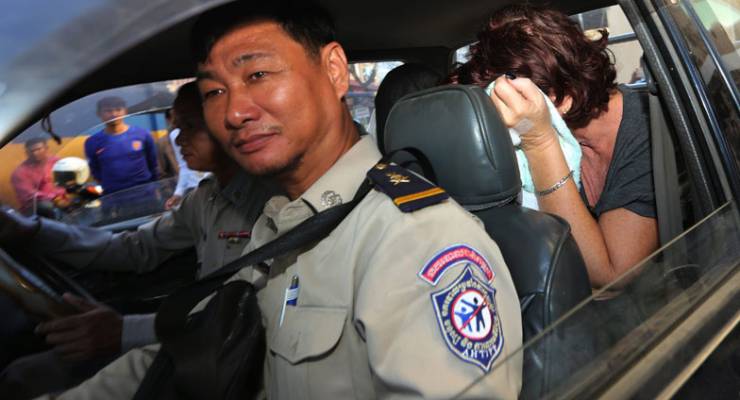
Tammy Davis-Charles in the custody of the Cambodian police
Australia is once more at the forefront of a regional surrogacy scandal.
Australian nurse Tammy Davis-Charles, 49, is in police custody in the Cambodian capital of Phnom Penh, accused of a range of offences from providing surrogacy services — this has been a legal grey area up until recently — to falsifying documents for infants. She ran a company that provided fertility services, including surrogacy, to Australian couples.
In the wake of the baby Gammy surrogacy scandal in Thailand two years ago, couples and other would-be parents from Australia — and elsewhere — have searched further afield into nearby countries, many without the often exemplary healthcare facilities available in Bangkok and other major cities in the so-called Land of Smiles.
After the Gammy case — and following that a wealthy Japanese man who had fathered 19 infants through surrogates — Thailand finally moved to enact laws that had been waiting the wings for about decade, legislating against using women in the country as surrogates for both foreigners and same-sex couples, the main customers of what had become a booming baby trade.
Surrogacy had been quietly surging as a growth industry in Thailand. I know personally of at least two couple whop have successfully had children to Thai surrogates and another that was in the midst of the process when the gate was slammed shut, affected hundreds of Australians.
[The legal and moral minefield of surrogacy]
Gammy is a boy with Down syndrome, one of twins born to Thai woman Pattaramon Chanbua using her eggs and the sperm of David Farrell, later to be found a convicted paedophile, and his second wife, Joy, a Chinese-Australian woman. Once they found out he had Down syndrome, they opted just to take his sister Pipah back to Australia. Pattaramon, who has two other children, kept Gammy, and the family seemed happy (if a little financially troubled, like most Thais) when I visited them about two months ago.
Meanwhile Davis-Charles, who has been praised as decent and ethical by people who have used her services, has been living in Bangkok for some years with her husband and has twin boys born to a Thai surrogate. She decided to ride the Cambodian wave, as first India and then Nepal were shut down by their governments as an option in Asia for surrogacy.
But it was always risky and Davis-Charles is now paying the price, trapped in an unforgiving legal system.
Since 2014, the Australian government’s official travel advice has advised Australians not to visit Cambodia for the purposes of engaging in commercial surrogacy arrangements.
“The travel advice states that the act of commercial surrogacy, or commissioning commercial surrogacy, is illegal in Cambodia with penalties including imprisonment and fines. The government strongly cautions Australians to consider all legal and other risks involved in pursuing international surrogacy, and to seek independent legal advice on Australian and foreign laws before travelling overseas for surrogacy purposes,” a spokesperson for the Department of Foreign Affairs and Trade told Crikey. “The Australian embassy is engaging with Cambodian authorities to seek clarity on the situation of unborn surrogate children.”
[What will George Christensen’s surrogacy inquiry find?]
Cambodian authorities have said they will provide amnesty for 23 Australians who have paid for surrogacy services through David-Charles’ company Fertility Solutions PGD, so they can pick up their children without fear of arrest.
But reports estimated that there are about 80 children belonging to Australian couples in utero, which leaves dozens of other couples in limbo. Most worryingly, there are reports that many of the pregnant women, in general impoverished and from country areas, have gone into hiding, concerned about government retribution in what can be a very harsh police state.
Still, this affair — like the Gammy case before it — continues to beg the larger question in Australia: why is surrogacy illegal in most states and very selective in the rest? Why do Australian governments force their citizens to seek solutions to their need for kids in countries where healthcare is less, often way less adequate — putting the lives of the women involved in more danger?
The United States, a far more conservative country than Australia, has a thriving — and far safer — surrogacy sector. Of course that is an option for Australians and many use it, but it is expensive, and it is not home.
But who, in the current political climate of attack first ask questions later, wants to raise a topic that is only catering to a needy few?
The issue is clouded, of course, these days by the growing desire of same-sex male couples to have children. Given the hysteria and homophobia on display over the “victim-less” — if you like — legislative change of gay marriage, one shudders to imagine the Christian right’s reaction to an issue where there are others involved, as consensual and sensible as that may be.
A grown-up country should be able to both have a debate about these issues. Right now one has to think, Australia is not that country.








Surely the surrogacy should be done in Australia, where one-country legal and medical protections can be applied. Further, genetic filtering should routinely be part of the process, with the same protections.
We must expect that choosing the sex of one’s baby will eventually become a standard option. Before the event we should have debated whether that is a Good Thing, Bad Thing, or just plain none of our business.
Is womb-for-rent really different to any other form of wage slavery?
Populations in poor countries have been providing the white west with their toys & diversions for generations.
Just what the planet needs, more children.